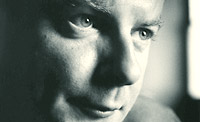
Some Methods of Crowd Control
The bells are ringing, shouldn’t we kneel?
As for me, I’m all for a pint,
let the children be taken shopping.
They need trousseaus, one and all,
before the war goes bust, said the minister,
making me blush and squirm
for an hour in front of the telly.
The landlady asked about dreams
and I told my first lie involving
three dogs and a swarm of bees.
My parents are very poor, they wrapped my body
in straw, then who knows what bliss
as long as we kill the mayor
who thinks we know nothing.
I spoke of my murky life and her eyes
responded in kind, as if there were no choice
between innocence and experience.
A hundred feelings pressed upon my heart.
So often is the enemy politically neutral
due to natural faithlessness and boredom
en route. Twice two makes death
and you talk of some route.
Impress your fellow travellers, dress smart,
don’t get wet, all the children will wave
and frighten flies away with their hats.
I spoke of death to the children
with an ease granted by profound conviction.
They did their best to go somewhere
and we all fit into the pantry
after a suitable interval.
That’s where only sinful books are read.
For fear of police raids, poets follow politicians,
making their lives into well-managed works of art,
encoded and hidden in any old glove. Couriers come
from the city regardless, men hang their rifles
on trees, young people play a game of flowers
trendy in the Dark Ages. I could have shot you like a fairy
princess in Venice, where Liszt
had his gloves chewed up by groupies,
and his shins, and trouser-legs.
An Englishman salvaged the cuff-links,
but we are unsure what that means.
A handsome secretary with a cigarette
might know, but is sure never to tell
my father in law how attractive you are,
sleepless in suburban areas or large
plots of land known as graveyards,
where the dead are frequently buried
and village churches stand proximate.
So how is it a lover of Paris
ran for the boondocks?
Was it her mother or our last kiss?
Will it be fair, my son?
The road is bad and wet.
All drink together, curse and patrol.
There is silence behind closed doors.
No smoking, no soft radio moans,
no drumming of fingers on sills,
no Ronsard. Scare or wipe out.
Both are cannons are in danger.
The barmaid’s eyes despatched me
to a small town ignored by novelists.
We arrived by train in moonlight,
emitting moral hints from spike-tips,
ashamed of the hour and that beastly bliss.
My second-in-comand, a modest man
of seven acres, burdened by contraband
family, bombarded by things and allegories,
grew impatient with Homer as I read him.
Who are we reading for? Let’s meet
the actresses and pay their expenses.
Please, not today, they are too much moved,
they’d think we’re sleepwalking
and choose a gypsy life in New York City.
Harder to know why there is so much gold
underground, if you would just dig a little,
encouraging the young ones with your fingers?
Where do the police find their brains?
Blink three times if they suit you.
Privates and NCO’s are to masturbate
in such situations, but we lack
the manpower to make sure they do
unflinchingly, and the buffeted, lip-smacking squirrels
making eyes at wild strawberries
never leave their sights.
Very funny, as long as we don’t leave
the graveyard, for there is nothing like nature
if you stay single and don’t panic.
A saner man would simply go to Paris.
Her dad played the guitar,
delivered flowers to police stations,
which is partly true, but some vases
were needlessly annihilated
in a matter of hours.
Translated by the Author.
Tadeusz Pióro, poet and translator, was born in 1960 and co-edits Dwukropek (with Andrzej Sosnowski). His translations into English include a selection of Tadeusz Borowski’s poems, published in 1990 by the Hit and Run Press in California. He is also adjunct professor of American Literature at the English Department at the University of Warsaw. Together with Rod Mengham and Piotr Szymor, he has edited the present anthology Altered State: The New Polish Poetry (Todmorden: Arc Publications, 2003).
His publications include:
Dom bez kantów [House without Corners] with Andrzej Sosnowski and Kuba Kozioł (Chicago: The Movable Feast Press, 1992)
Okęcie (Waszawa: Przedświt, 1993)
Wiersze okolicznościowe [Circumstantial Poems] (Lublin: Kresy, 1997)
Syntetyczność [Syntheticity] (Legnica: Centrum Sztuki—Tear Dramatyczny, 1998)
Wola i Ochota (Legnica: Biuro Literackie, 2000)

Tadeusz Pióro
Tadeusz Pióro (b.1960) has published six books of poems. A selection of his work in English, Infinite Neighbourhood, is out from Equipage. He teaches at the English Department at the University of Warsaw. Together with Andrzej Sosnowski, he has translated Three Plays by John Ashbery, The Princess Zubaroff by Ronald Firbank and is well into A Nest of Ninnies by Ashbery and Schuyler.